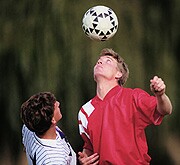- 10 Strategies to Overcome Insomnia
- Could Artificial Sweeteners Be Aging the Brain Faster?
- Techniques for Soothing Your Nervous System
- Does the Water in Your House Smell Funny? Here’s Why
- Can a Daily Dose of Apple Cider Vinegar Actually Aid Weight Loss?
- 6 Health Beverages That Can Actually Spike Your Blood Sugar
- Treatment Options for Social Anxiety Disorder
- Understanding the Connection Between Anxiety and Depression
- How Daily Prunes Can Influence Cholesterol and Inflammation
- When to Take B12 for Better Absorption and Energy
Sports Medicine Docs Offer Safety Tips for Young Athletes


Kids are back to school and back to sports, which inevitably leads to bumps and scrapes and possibly even more serious sports-related injuries.
Doctors in the sports medicine division at Cincinnati Children’s Hospital Medical Center in Ohio say preparation is the key to reducing the risk of these injuries.
First, they recommend that children start exercising long before a sports season begins — at least four to six weeks earlier.
Children and teens should get used to hot weather workouts by gradually increasing their time outdoors in heat and humidity. This should take place over the first 10 days to two weeks of practice.
Young athletes need to drink plenty of fluids and take breaks every 10 to 15 minutes, the doctors said. They should wear light clothing and limit their exposure to the sun if they’re outside during the hottest time of the day. One way to stay cool is to apply towels soaked in ice cubes and water to the head and neck.
If a child appears to be suffering from heat illness, move the youngster into the shade or coolest area nearby. Cool them by exposing their skin to ice or cold water and cool, circulating air, the doctors advised.
The doctors recommended that children with asthma should use preventive inhalers 20-30 minutes before exercise, do a gradual warmup, and have an inhaler close by during practices and games or competitions.
Young athletes should wear all recommended protective gear and it should be properly fitted. The doctors said youngsters should be instructed to immediately tell the coach or trainer if they feel dizzy, foggy, have a memory lapse or have a headache after taking a blow to the head.
Children with these symptoms should not return to the same game, competition or practice and should be checked by a doctor before they return to their sport, the doctors advised.
Each year, about 3.5 million American children and teens 14 and younger suffer from sports or recreation injuries, the American Academy of Pediatrics (AAP) said. More than 775,000 are treated in emergency departments for sports-related injuries, according to the AAP.
More information
The American Academy of Pediatrics has more about sports injury prevention.
Source: HealthDay
Copyright © 2026 HealthDay. All rights reserved.










